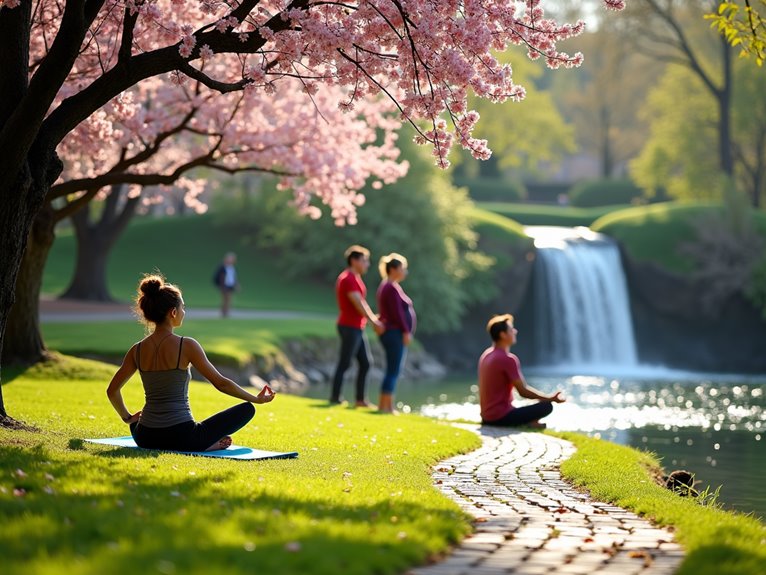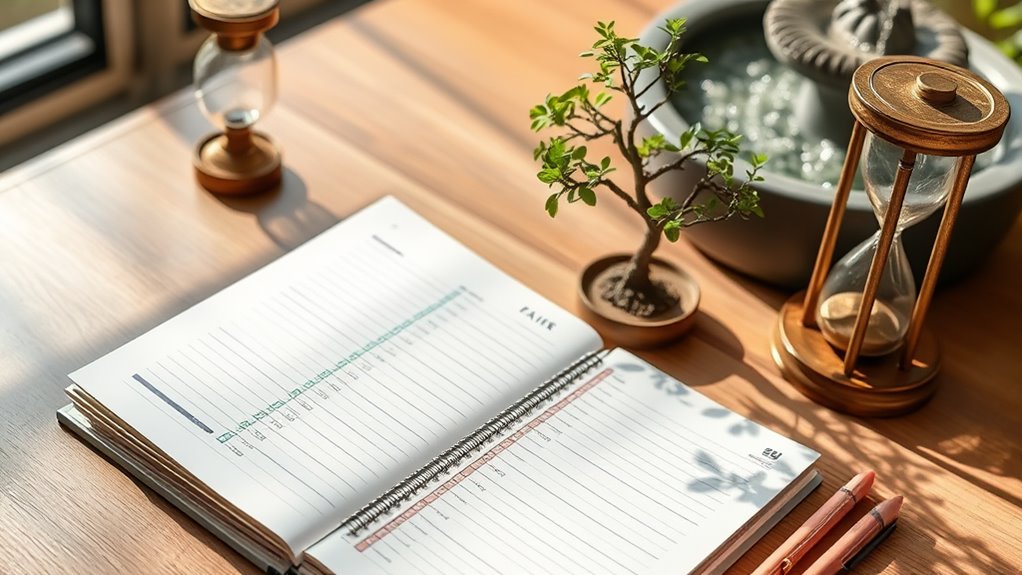
Managing stress starts with mastering time management by prioritizing tasks and embracing progress over perfection. Set achievable goals and track their progress. Don’t underestimate the power of nutrition and getting enough sleep. Incorporate regular exercise to boost your mood and reduce stress levels. Practice stress relief techniques like deep breathing and mindfulness meditation. Foster strong social connections for support and engage in enjoyable hobbies to unwind. Balance work with leisure through consistent routines, and practice positive self-talk to maintain a healthy mindset. There’s so much more to explore on each of these techniques to transform your stress management approach.
Master Time Management
Effectively managing your time is vital in minimizing stress in everyday life. Start with clear task prioritization by listing daily or weekly activities and rating each by urgency and importance. Harness planning strategies with tools like color-coded calendars or apps to keep tasks in order. This minimizes clutter, allowing you to focus on what’s essential and avoid accumulating urgent tasks. Pay attention to blood sugar management as fluctuating levels can impact focus and energy, potentially disrupting your time management efforts.
Don’t let procrastination control your schedule. Break large assignments into smaller, digestible blocks and apply the Pomodoro Technique: work for 25 minutes, then enjoy a 5-minute break. This can help establish effective deadline setting, letting you tackle tasks with confidence. Regular breaks contribute to sustained focus and overall well-being, ensuring you maintain productivity throughout the day.
Embrace a mentality of progress over perfection to swiftly start and finish tasks. Commitment management is vital—learn to say “no” to unnecessary engagements. This enhances your time efficiency as you combine tasks, plan ahead, and create realistic, specific goals.
Time tracking through these methods guarantees you strike a balance between productivity and relaxation.
Prioritize Nutrition and Sleep
When it comes to minimizing stress, prioritizing nutrition and sleep can make a significant difference. You’ll find liberation through meal planning and nutrient timing, supporting your body’s natural rhythms. Eating regularly stabilizes blood glucose levels, preventing dips in energy and mood that heighten stress. A balanced diet is essential, as poor nutrition can worsen the effects of stress on your health. A well-timed meal, rich with omega-3 fatty acids from foods like flax seeds or fish oil, helps reduce anxiety and boost brain function. High-fiber options such as oatmeal and nuts keep you alert and level-headed, combating stress at its roots. Additionally, incorporating mindful eating techniques such as deep breathing and paying attention to food textures can enhance your awareness and aid in managing stress effectively.
Remember, balance is key. Whole, nutrient-rich foods fuel your ability to manage stress. Skipping meals might seem quick, but it leads to imbalance and increased stress. Instead, prepare meals that combine multiple food groups for thorough nutrition.
Mindful eating ties it all together, making certain you savor every bite and understand your hunger cues. It’s about aligning with yourself, not against.
Adequate sleep complements your nutritional efforts. It repairs cells and regulates stress hormones, preventing cravings for sugar-laden snacks. Quality rest recharges you, paving the way for a stress-free day.
Incorporating these lifestyle choices lets you break free from stress’s grip.
- Key Points:
- Eat meals combining food groups to make certain of balanced nutrition.
- Include omega-3 fatty acids and high-fiber foods for brain support.
- Use meal planning and practice mindful eating.
Embrace Regular Exercise

A balanced approach to stress management includes not only nutrition and sleep but also regular exercise. Engaging in fitness routines or outdoor activities can greatly reduce your levels of stress hormones like adrenaline and cortisol, while boosting the production of endorphins—your body’s natural painkillers and mood elevators.
These endorphins create a sense of euphoria often referred to as the “runner’s high,” bringing feelings of relaxation and optimism. You don’t need to commit hours; even 20-30 minutes of cardio can make a noticeable difference.
Exercise is your escape; it’s a “time-out” from daily worries. It enhances mental health by boosting self-esteem and reducing anxiety, depression, and bad moods. Through regular activity, you’ll bolster your emotional resilience, making it easier to tackle life’s challenges with a clear mind and renewed energy.
Beyond mental wellness, exercise strengthens muscles and bones, improves blood circulation, and supports weight management, reducing your risk of chronic diseases. Regular physical activity also supports memory function by enhancing neuroplasticity and promoting neurogenesis, contributing to improved cognitive abilities.
Fitness routines provide a profound sense of liberation, offering social benefits as you connect with others. Whether you choose to walk, swim, or practice yoga, you’ll find that embracing exercise frees your spirit, enhancing both body and mind.
Practice Stress Relief Techniques
Looking to shake off stress? Immerse yourself in stress relief techniques that free your mind and soothe your spirit. Start with deep breathing exercises to reset your nervous system. Techniques like pranayama or the 4-7-8 method can help lower cortisol levels. Focus on each breath to melt away anxiety and engage your senses.
Mindfulness meditation is another powerful ally. Apps like Headspace offer guided sessions that declutter your mind and rejuvenate your focus. Even a few moments of silent meditation twice daily can work wonders. Embrace the present, observing your thoughts without judgment, and watch stress dissolve.
Explore progressive relaxation by settling into a quiet space. Let guided imagery transport you to a favorite destination, engaging all your senses for a profound relaxation experience. Aromatherapy techniques can further enhance your calm – scents like lavender and bergamot work wonders.
For a more structured approach, consider practicing progressive muscle relaxation, a method that involves alternating between tensing and relaxing muscles for a deep relaxation response.
When you’re strapped for time and seeking quick activities, remember:
- Take a short walk for fresh air and a mental reset.
- Engage with music to lighten your mood and soothe tension.
- Use a stress ball for immediate physical relief.
Cultivate Positive Self-Talk

Words have power, particularly the ones you direct toward yourself. Harnessing the strength of positive self-talk can transform your daily experience by reducing stress and enhancing emotional resilience. When faced with challenging situations, self-talk strategies like reframing your thoughts into optimistic affirmations can help. Instead of saying, “I can’t manage this,” try, “I’ll do the best I can.” This subtle shift in language nurtures a more hopeful outlook, directly impacting your mental health, performance, and relationships.
To cultivate this mindset, start by identifying your negative thought patterns. Keep a diary to track these thoughts, recognizing what triggers them. Once identified, challenge and replace them with positive alternatives. Think of it as offering yourself the same supportive advice you’d give a friend.
Incorporating mindfulness meditation can further support this process by reducing overthinking and promoting a present-focused mindset essential for positive self-talk. Integrating positive self-talk into your routine doesn’t stop there. Try using meditative techniques, like breathing exercises, to establish a calm, controlled state of mind.
Furthermore, surround yourself with positivity—engage with uplifting individuals and immerse yourself in environments that inspire. Combining these strategies with positive affirmations like, “I am doing well,” won’t only reduce stress but also empower you to live more freely and abundantly.
Engage in Enjoyable Hobbies
Hobbies can be your personal sanctuary, offering a break from the daily pressures and providing a means to manage stress effectively. Whether it’s art therapy or nature walks, diving into a hobby can transform how you handle anxiety.
Immersing yourself in creative endeavors like art offers powerful therapeutic benefits. Art therapy not only lifts your mood but also expands neural connections and intensifies dopamine release, generating happiness and calmness.
Consider taking short nature walks. These can be a meditative escape, grounding you in the present and distracting you from nagging thoughts. As you step into the lush embrace of nature, your heart rate slows, and your worries diminish, leaving you feeling rejuvenated.
To enhance your journey towards wellbeing, try these hobbies:
- Gardening: Connect with nature by nurturing plants, reducing cortisol levels, and improving mood.
- Coloring: Engage nostalgia and creativity, promoting mindfulness and relaxation in your day.
- Photography: Capture moments and emotions, offering a unique stress outlet that boosts positivity.
Build Strong Social Connections

When life feels overwhelming, building strong social connections can be an essential tool for managing stress. Embrace the liberation that comes with engaging in social gatherings, as they offer a break from daily pressures.
Spend quality time with family and friends to tap into emotional support and find revitalization. These bonds reduce stress and improve health, turning ordinary conversations into opportunities for relief.
Don’t hesitate to make the first move in reconnecting with old friends—strengthening social bonds brings invigorating freedom.
Community involvement can also create a sense of belonging. Volunteering, joining clubs or hobby groups, and engaging in community events expand your network and reduce isolation.
Small acts of connection, like casual interactions with acquaintances or neighbors, make a significant impact. By leveraging technology connections—social media, text, or emails—stay in touch with those who enrich your life.
Utilize Mindfulness Practices
Exploring mindfulness practices offers powerful tools for managing stress and enhancing overall well-being. Mindfulness meditation transforms your mind, reducing stress by shrinking the overactive amygdala. This quiets your stress-alert system and fosters emotional regulation.
Embracing present awareness allows you to attend to the “now” without the burdens of the past or future, enhancing your mental strength. Through self-compassion practices, you offer yourself comfort, cultivating a supportive, safe environment within.
Incorporating mindful breathing can help activate deep relaxation, lowering your heart rate and blood pressure. These breathing exercises—like inhaling for four counts and exhaling for six or more—help shift your focus from “doing” to “being”.
With stress resilience as your goal, allow the natural flow of breath to guide you into a space of calm.
Structured programs such as Mindfulness-Based Stress Reduction (MBSR) provide thorough approaches to deepening your practice. They blend mindfulness meditation with elements like body scan meditation and yoga, nurturing emotional intelligence and reducing conflict.
Consider these to reinforce your journey towards liberation:
- Mindful breathing: Soothes and centers with intentional breaths.
- Present awareness: Embrace each moment fully and freely.
- Self-compassion: Cultivate kindness for yourself in daily practices.
Set Achievable Goals

Setting achievable goals is an essential strategy for managing stress effectively. When you clearly define what you want to accomplish, stressors like work-related anxiety become less overwhelming. Start by visualizing your goals—a mental picture can be incredibly motivating. Align them with your core values to enhance personal liberation. For instance, if stress reduction’s your target, aim to practice deep breathing exercises daily.
Break down your big goals into smaller, easy-to-manage tasks. This way, you maintain clarity and stay motivated. Progress measurement is key; track your success using clear metrics. Count how often you engage in stress-reducing activities and keep tabs on your anxiety levels with an app. Milestones will keep you focused and reward your dedication.
Ensure your goals are attainable. It’s important to recognize your resources and skillset—ambitious targets lead to frustration. Craft realistic, manageable steps and engage accountability partners to hold you to your goals, providing support when needed.
Create a timeline for each goal. Setting deadlines keeps you disciplined and on-task. Break larger ambitions into micro-goals with specific timeframes, making progress measurable and less stressful. Prioritize what’s realistic to stay consistent and committed.
Balance Work and Leisure
To effectively balance work and leisure, make certain to prioritize relaxation time by setting aside moments for unwinding daily.
Integrate short breaks throughout your day to recharge and maintain focus.
You can also schedule regular leisure activities in your calendar to guarantee they don’t get overshadowed by work commitments.
Prioritize Relaxation Time
Balancing work and leisure is essential for reducing stress and improving overall well-being. You’ll find that prioritizing relaxation time is your ticket to liberation from the daily grind.
By carving out mindful moments and engaging in leisure planning, you can transform your lifestyle into one that’s fulfilling and stress-free. Begin by setting boundaries between work and personal life, guaranteeing leisure time is truly yours. Use technology to remind you to unplug and focus on activities that nourish your mind and body.
Try implementing these steps to bring balance and tranquility to your life:
- Schedule it: Mark leisure time in your calendar as non-negotiable. It’s as important as any work meeting.
- Engage mindfully: Choose activities like meditation or yoga to rejuvenate your mind. This isn’t just relaxation; it’s a means of finding deeper harmony.
- Mindful moments in nature: Let nature renew your spirit through activities like hiking or walking. Connect with your surroundings and let go of stress.
Declining unnecessary commitments guarantees your leisure is uninterrupted and meaningful.
Integrate Daily Breaks
Taking daily breaks isn’t just a luxury—it’s a necessity for maintaining balance in your life. Embracing different break types can transform your day, reducing stress and boosting energy levels.
Envision short bursts of outdoor refreshment or energizing creative endeavors that help rejuvenate your mind and body. Regular social breaks foster connection, reinforcing a sense of belonging and well-being, while digital detox breaks offer mental respite from the relentless digital strain.
These breaks aren’t just about stepping away; they’re about stepping towards a more vibrant, stress-free self.
Consider the break frequency that’s ideal for you. Integrate hourly micro-breaks to shake off mental fatigue and prevent the monotony of a relentless work grind.
Every 2-3 hours, indulge in short breaks to reset focus and recharge mental clarity. By adopting flexible break schedules, you honor your unique work rhythm, ensuring breaks cater to your personal needs.
The Pomodoro technique, involving 25-minute work periods followed by 5-minute breaks, is another dynamic method to keep stress at bay. By consciously weaving these breaks into your routine, you’ll discover not only enhanced energy but also a liberation from the shackles of constant stress.
Schedule Leisure Activities
Achieving a harmonious balance between work and leisure is essential for your overall well-being. Effective scheduling allows you to carve out time for leisure activities, reaping substantial benefits. By designating moments for creative outlets like art or cooking, you not only express yourself but also combat solitude through social engagement.
These shared experiences enhance your social skills and build positive health habits.
Explore the great outdoors with activities such as hiking or simply enjoying time in a garden. Outdoor activities are valuable for reducing stress and enhancing your well-being.
Furthermore, integrating mindfulness exercises like meditation into your routine can center your focus, helping you manage thoughts and emotions constructively.
Leisure activities offer these advantages:
- Leisure Benefits: Lower stress, better sleep, and sharper memory.
- Social Engagement: Form deeper connections while volunteering.
- Routine Building: Create consistency through structured leisure time.
Volunteering opportunities not only allow you to give back but also provide a deep sense of fulfillment.
Make certain these activities are routinely part of your schedule to avoid work encroachment. Prioritizing leisure is your key to liberation. It enhances mental health, boosts productivity, and fosters better physical health, leading to a more balanced life.














